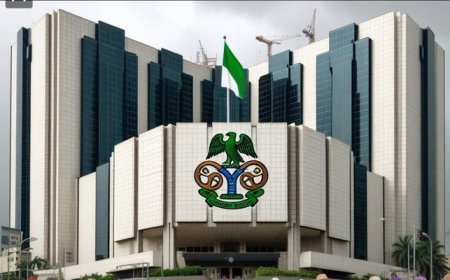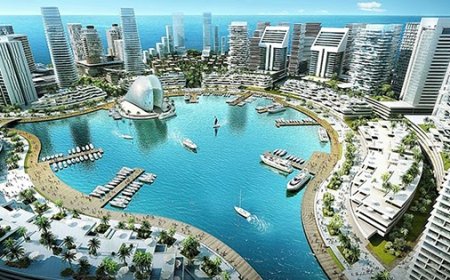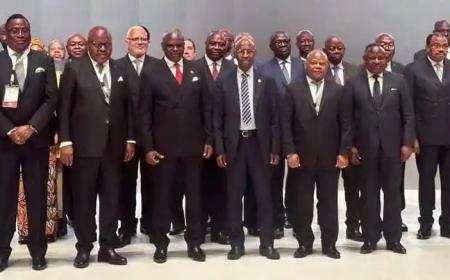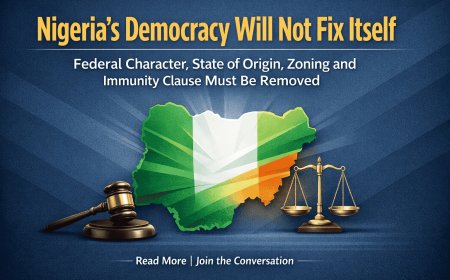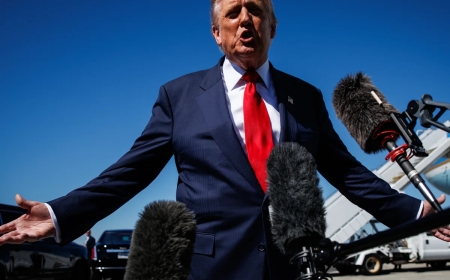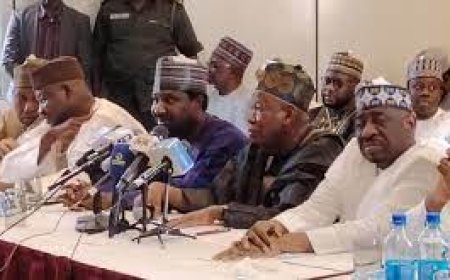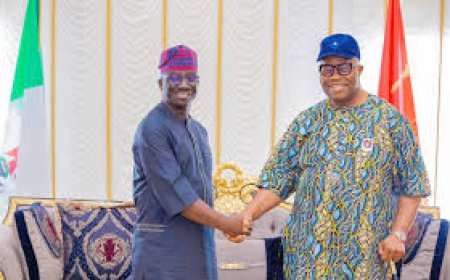Early Warning Brief: U.S. Flags Nigeria as a Country of Particular Concern Amid Talks of Possible Military Action
A concise early-warning analysis on the U.S. designation of Nigeria as a Country of Particular Concern and the rising conversations around potential military intervention. This brief explains the implications for national security, diplomacy, human rights, and regional stability in West Africa.
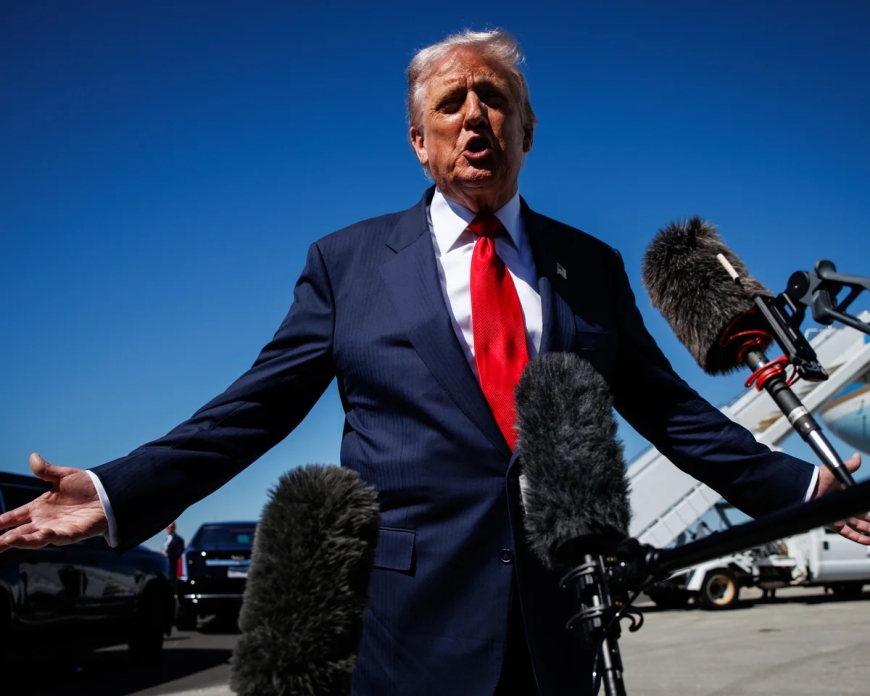
1. Background & Context
On 31 October 2025, the U.S. President Donald Trump redesignated Nigeria as a Country of Particular Concern (CPC) under U.S. religious-freedom law, citing allegations of large-scale killings of Christians and stating that Christianity in Nigeria faces an “existential threat.” The designation follows sustained pressure from U.S. lawmakers and campaigning groups and immediately produced strong reactions in Abuja rejecting the “genocide” frame. Subsequently, President Trump posted on social media that the US would cut off all aid to Nigeria and go in “‘guns-a-blazing’ to completely wipe out the Islamic Terrorists” if the killings continue. Trump also stated that he had instructed the “Department of War” (formerly the Department of De- fense) to prepare for possible military action.
The U.S. action is driven by sustained advocacy by U.S. lawmakers, NGOs and faith groups, as well as Nigerian lobbyists citing large numbers of attacks on Christian communities and pressuring the U.S. executive and Congress for action. The U.S. Secretary of State, Marco Rubio, has been an advocate of the redesignation of Nigeria as a CPC since 2021 when he was in the Senate. The Nigerian government’s response consisted of immediate denial of the characterization of the situation as a “Christian genocide,” pledges to tackle violent extremism, and calls for dialogue, with official messaging highlighting the fact that violence affects both Christians and Muslims and points to criminal and terrorist actors rather than state policy. It has also indicated that it would welcome U.S. help in fighting insurgents as long as any assistance respects Nigeria's sovereignty.
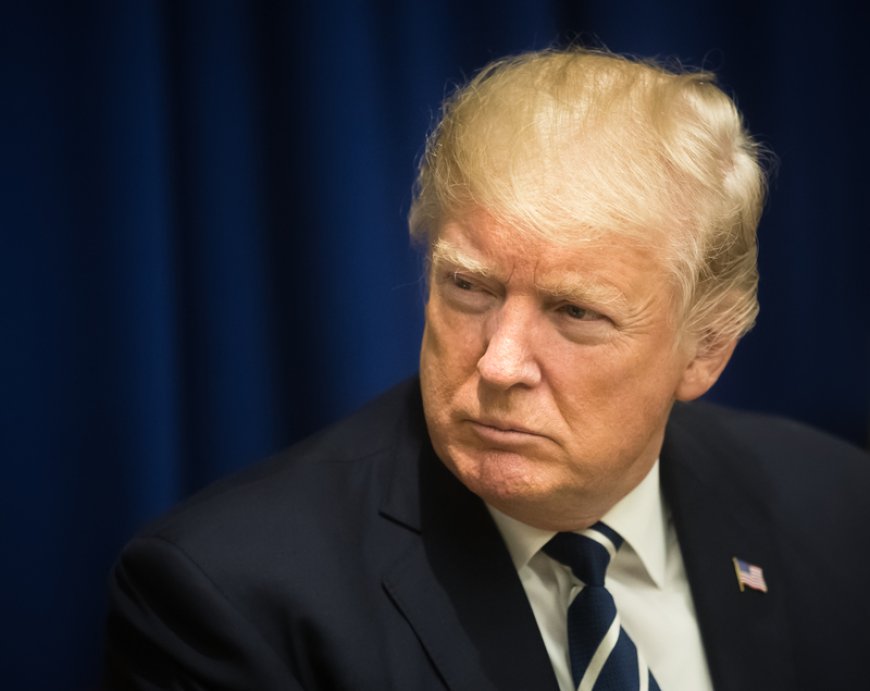
READ MORE:
- The rise of modern day witchcraft and the hidden influence of manipulation and selective targeting across institutions
- Meet The King Of Ethical And Professional Debt Recovery In Africa 2024 By IDRPN
- More Than Just Debt: 5 Hidden Legal and Financial Consequences of a Bounced Cheque in Nigeria by Prof. Prisca Ndu
- Navigating Modern Debt Collection in Nigeria: Ethical Recovery and Financial Integrity by Dr. Ohio O. Ojeagbase
- Nigeria Financial Security: Dr. Ohio O. Ojeagbase Leads Financial Integrity Initiatives During International Fraud Awareness Week
The designation raises the prospect of U.S. congressional and executive measures (visa restrictions, targeted sanctions, aid restrictions) alongside the possibility of hostile military intervention on Nigerian soil, and will shape international narratives about Nigeria’s security and human rights environment. The latest tensions represent the lowest point in Nigeria–U.S. relations since the mid-1990s, when Washington led international efforts to isolate the then- governing military regime through a sanctions campaign that was aimed at returning Nigeria to democratic governance.
In an earlier report released in January this year, we had assessed that there was a high likelihood that the new Trump administration would reclassify Nigeria as a country of particular concern.1 This briefing assesses the direct and indirect implications of Trump’s action for Nigeria–U.S. relations and domestic stability, identifies principal risks, and presents urgent and medium-term measures the Federal Government should adopt across diplomatic, political, security, inter-religious and military domains to manage the crisis, protect communities, and reduce the probability of escalation.
2. A Brief Overview of Nigeria–U.S. Relations over the Past Thirty Years
Relations between Nigeria and the United States over the past thirty years have evolved from diplomatic isolation during the mid-1990s military regime to a strong strategic partnership centered on democracy, security cooperation, and economic ties. The relationship has experienced both periods of close cooperation and intermittent tension. During the military dictatorship of General Sani Abacha, relations deteriorated significantly. The U.S. suspended military technology transfers, imposed unilateral sanctions, and worked to isolate the regime internationally due to the annulment of the 1993 presidential election and human rights abuses. Nigeria became a "pariah state" in the view of the international community, though economic ties, particularly in the oil sector, remained surprisingly resilient.
The restoration of civilian democratic rule in May 1999 marked a significant turning point. The U.S. actively supported Nigeria's democratization process, and relations warmed considerably. This era saw an increase in U.S. aid and trade links, with Nigeria emerging from its diplomatic isolation. In the 21st century, the relationship has been characterized by closer ties and strate- gic partnerships, although with occasional strains. A major focus has been the fight against terrorism, specifically the Boko Haram and ISIS-West Africa Province (ISWAP) insurgencies. TheU.S. has provided substantial security assistance, including the sale of aircraft and extensive military training programs, while also emphasizing human rights and mitigating civilian casualties.
The U.S. is Nigeria's largest foreign investor, with investments concentrated in the petroleum, mining, and wholesale trade sectors. Nigeria is a significant trade partner for the U.S., exporting crude oil, cocoa, and cashew nuts, and importing vehicles, wheat, and machinery. The U.S. has also invested billions of dollars in Nigeria's public health systems, particularly through the PEPFAR program to combat HIV/AIDS, as well as addressing other diseases like tuberculosis and COVID-19. Tensions have flared occasionally, such as over the U.S. invasion of Iraq in 2003, Nigeria's inclusion on a terror watch list after the 2009 “Underwear Bomber” incident, and U.S. concerns about corruption and human rights issues within Nigerian security forces.
1 The Age of Disruption: Nigeria – U.S. Relations in the Second Presidency of Donald Trump; A Preliminary Assessment (OSPRE; January 2025) p.44
The relationship between Nigeria and the United States concerning crude oil sales has shifted significantly in recent years, primarily driven by increased U.S. domestic oil production and, more recently, the operational dynamics of Nigeria's new Dangote Refinery. The U.S. has historically been a major importer of Nigerian crude. However, the American shale oil boom has drastically increased U.S. domestic production, reducing its overall reliance on foreign light, sweet crude (which Nigeria produces). This led to a general decline in the volume of Nigerian oil imported by the U.S. over the last decade. The new Dangote Refinery (Africa's largest) is a also major factor. It requires a consistent crude supply. When the Nigerian National Petroleum Company (NNPC) could not meet the refinery's demand for inputs (partially due to declining national production and security challenges like oil theft), the refinery began importing cost- effective U.S. crude. This reflects a strategic business shift and highlights Nigeria's domestic supply challenges.
In summary, the relationship has evolved from one where Nigeria was a consistent top-five supplier to the U.S. to a more dynamic and competitive market situation, with declining U.S. imports and, occasionally, U.S. exports flowing to Nigeria. This has significantly eroded the strategic leverage that Nigeria has historically wielded as Africa’s leading oil-producing nation and a top supplier to the U.S.
The Guardian, July 11 2025
3. Key Findings
3.1. Why Now?
The designation announced by President Trump re-introduces Nigeria to the U.S. CPC list after prior designations under earlier administrations and subsequent removal. The difference between the current situation and the previous designation is that unlike in 2020 when Trump was on his way out of office, the recent designation comes in only the first year of his second term in office with three years left, within which he can escalate his rhetoric and ramp up hostile measures against Nigeria. The prominence given to the narrative of a genocide of Christians as well as the overt threat of military action against non-state actors on Nigerian soil are a marked departure from the language of previous designations and signals Trump’s willingness to raise the stakes.
3.2. Assessing American Support for the Redesignation of Nigeria as a CPC
Former U.S. Vice President Mike Pence has supported Donald Trump's designation of Nigeria as a “Country of Particular Concern” for religious freedom violations, but reports do not indicate he explicitly backed a call for direct U.S. military inte`rvention. Pence specifically commended Trump “for making it clear to the government of Nigeria that we will not tolerate the mass slaughter of Christians”. His statements focused on the protection of religious liberty and the designation itself, rather than endorsing the use of U.S. military force on Nigerian soil.
Similarly, Mike Pompeo, who served as Secretary of State in the first Trump administration has also endorsed the redesignation of Nigeria as a CPC. As Secretary of State, Pompeo championed the prior classification of Nigeria as a CPC in 2020. It is important to note that at present, neither Pence nor Pompeo are as aligned with Trump as they were in his first administration. Both relationships are fractured, and their political paths have diverged. The relationship between Trump and Pence is fully broken over the latter’s refusal to reject the 2020 electoral votes on January 6, 2021, which Trump and his supporters viewed as a betrayal. Subsequently, Pence explicitly stated in March 2024 that he would not endorse Trump for president in the 2024 election due to “profound differences” on a range of issues, including constitutional duties and key conservative policies.
Pompeo's relationship with Trump is also strained, after he mulled over running for president himself in 2024. He eventually endorsed Trump's 2024 campaign and has worked to remain a figure within the broader Republican Party. Following his 2024 election victory, Trump explicitly announced that he would not invite Pompeo to join his second administration, a move influenced by opposition from some of Trump's close allies, including his son Donald Trump Jr. The fact that these two former Trump allies have publicly stated their support for the redesignation of Nigeria as a CPC would seem to suggest that the quest to protect Christians in Nigeria is a potent unifying political theme, even among non-aligned Republicans.
Several Republican members of Congress have similarly expressed support for Trump’s action. The endorsements represent a stance of support from other wings of the Republican party and would seem to indicate broad support of the redesignation of Nigeria as a CPC, even if not a full endorsement of American military intervention.
3.3 The Diplomatic Vacuum
The absence of high-level diplomatic representation of Nigeria in Washington constitutes an egregious strategic handicap that has nullified the country’s ability to engage directly with the U.S. Government and the State Department and Congress, in particular. The resulting vacuum has enabled Nigerian groups, particularly Christian groups as well as the Independent People of Biafra (IPOB) – to seize the ground through effective lobbying that has shaped perceptions of the Nigerian government within Congress, the State Department, and at the highest levels of the Trump administration.
3.4 The Risk of Military Intervention
We assess that direct U.S. military intervention remains improbable due to strategic, politi- cal, and legal constraints. The U.S. is unlikely to commit troops to a conflict framed around religious protection, given the domestic political costs and potential for regional destabilization. The CPC designation is primarily a diplomatic tool to enable sanctions and influence policy, not an authorization for armed intervention. Washington’s most probable immediate course of action includes conditioning military aid, imposing targeted sanctions, and pressing Abuja to take visible measures to protect civilians. U.S. support for Nigerian security forces, including training and intelligence sharing, may be expanded, but tied to human rights benchmarks.
2 Erik Prince is an American businessman, investor, and former U.S. Navy SEAL officer. He is known for founding the private military company Blackwater. He is also the brother of former U.S. Secretary of Education Betsy DeVos. Prince founded Blackwater (later Xe Services and Academi) in 1997 and served as CEO and chairman until its sale in 2010. He also founded the private equity firm Frontier Resource Group and chaired Frontier Services Group. His companies have secured significant security contracts. Blackwater faced controversy during the Iraq War, notably the 2007 Nisour Square massacre where guards killed Iraqi civilians. The guards were later pardoned by President Trump. Prince and his company have faced accusations related to civilian deaths and corruption. Prince has previously been quoted as saying that African countries should be recolonized due to the corruption of their leaders, and has advocated for the use of private military companies (PMCs) to handle security challenges that he believes national governments or international bodies are failing to address adequately.
3.5 The Risk of Private Military Involvement
Nevertheless, we also assess that there is moderate risk of covert action or limited private security involvement by private military corporations (PMCs). Erik Prince2, a private military entrepreneur and close associate of President Trump, has advocated for the use of PMCs in military operations targeting Mexican cartels. Companies linked to Erik Prince, such as Vectus Global, have pursued security contracts in fragile states (e.g. Haiti). Prince has expressed concern over the security situation in Nigeria, particularly the persecution of Christians, and has publicly offered the services of private military contractors to address the issue. In late 2025, in response to a social media post by Trump about the persecution of Christians in Nigeria, Prince publicly replied: “Sir, you have my number. Standing by to assist”. He also publicly urged Pope Leo XIV to help fund his colleagues and their private security operations to protect Nigerian Christians from escalating violence by “marauding Muslims and Fulani Herdsmen”.
3.6 Covert Action
In September 2003, the U.S. Secretary of Defence, Donald Rumsfeld issued an order expanding the range of covert operations that the Joint Special Operations Command (JSOC) 3 could carry out anywhere in the world without notifying Congress. These operations aimed at destroying al Qaeda and its supporters worldwide could occur in fifteen designated countries. Among them were Nigeria, Mali and Somalia, where these covert forces would, in most cases, require at least the tacit approval of the involved countries.4 Under the circumstances, a prospective American military intervention in Nigeria (could potentially be undertaken without informing the Nigerian government) would be based on a tactical spectrum ranging from the covert infiltration by JSOC operatives, drone strikes on terrorist tar- gets, long-range strikes on targets, and ultimately (but more unlikely), a large scale deployment of infantry.
3.7 Repercussions of Military Intervention
While a PMC operation in Nigeria could occur through private or covert contracts, overt deployment to protect a specific religious group would be diplomatically explosive and likely to provoke Nigerian and regional backlash. The incidence of civilian casualties stemming from the use of drone strikes has been problematic in theatres across the world as well as in Nigeria, and will most certainly ignite local resentments that could be exploited by hostile actors. Internally, a U.S. military intervention would inflame Nigeria’s sectarian fault lines and aggravate threats to social cohesion. It would also transform Nigeria into a central front in an already volatile region and trigger an influx of international terror syndicates into what they would see as the new frontline for confronting the “infidel West”.
3 The Joint Special Operations Command (JSOC) is a component command of the United States Special Operations Command (USSOCOM) that studies, develops and executes special operations missions. Created in 1980 with an initial focus on counter-terrorism, it conducts operations worldwide and oversees some of the military's most elite units.4 Dana Priest and William M. Arkin, Top Secret America: The Rise of the New American Security State (Back Bay Books 2011) p. 236
4. Likely Short-term Implications of the CPC Classification
· Diplomatic Friction and Visibility: Elevated tensions and demands for briefings;
· Risk of Targeted U.S. Measures: Possible visa bans or aid restrictions;
· Narrative Amplification Domestically and Internationally: Risk of increased polarization in Nigeria; and
· Pressure on Security Cooperation: Conditionality or review of training and aid.
5. Recommended Measures
Diplomatic Engagement
5.1 Open Immediate High-Level Channel to Washington
Nigeria should restore its ambassadorial presence in Washington to reflect its status as the largest Black Democracy. Limited diplomatic representation has made Nigeria vulnerable to US policies like tariffs and potential travel bans. Since Nigeria is a major source of African immigrants in the US, appointing a credible diplomat with bipartisan ties could strengthen US–Nigeria relations and rebuild trust. A major diplomatic initiative that engag- es the White House, the State Department, Congress and key non-governmental constitu- encies such as the Evangelical Right (a consistently strong bastion of support for Trump) should involve both formal government-to-government interaction, as well as outreaches that mobilize carefully identified non-state figures in the Nigerian diaspora.
5.2 Strengthen Bilateral Defence and Security Cooperation with the U.S.
The United States has historically been reluctant to sell certain offensive weapons to Nigeria, primarily due to long-standing human rights concerns and the restrictions imposed by the U.S. laws like the Leahy Laws.5 However, this situation has evolved, and the U.S. has recently approved significant arms sales. Past U.S. administrations, notably under President Barack Obama, placed embargoes or holds on “lethal” weapons sales because the Nigerian military was repeatedly accused by human rights organizations and the U.S. State Department's own reports of gross human rights violations.
The situation has shifted in recent years: Obama-era blocks were lifted during the first Trump administration, which approved sales of aircraft. The Biden administration also moved forward with significant sales, signaling a deepening defence partnership. In August 2025, the U.S. Department of State approved a potential Foreign Military Sale to Nigeria worth an estimated $346 million, which includes munitions, precision bombs, and rockets for use in counter-terrorism operations. This follows another $997 million package approved in 2022, which included 12 AH-1Z attack helicopters. Although the 2022 deal was initially stalled in the US Senate due to rights concerns, procurement of the helicopters is reportedly now underway.
The current situation represents an opportunity to ramp up the procurement of offensive weaponry and escalate current counterterrorism measures while enhancing civilian harm tracking and mitigation protocols.
5.3 The Need for Strategic Coordination of Joint Security – Military Initiatives
An all-important caveat is that Nigeria–U.S. counterterrorism cooperation that escalates offensive measures against terrorism in Nigeria must be seen to be a joint effort (American intelligence, surveillance and reconnaissance, air support, and other covert supplements yoked to Nigerian infantry) rather than a unilateral action by the U.S. which would immediately delegitimize the intervention and stir radical resentment locally.
5.4 Strategic Communications
In this moment of historic tensions between allies, Nigerian authorities should, as part of their messaging, draw on the traditional solidarity that has bound Abuja and Washington in the shared cause of combating terrorism. In the immediate aftermath of the September 11, 2001, attacks on the U.S., President Olusegun Obasanjo was the first African head of state to visit the U.S. capital to express condolences and discuss cooperation met with President George W. Bush in during a private visit on November 2, 2001, less than two months after the attacks. The Australian Prime Minister John Howard was in Washington and met with President Bush the day before the attacks (September 10, 2001) and remained in the city on the day of the attacks, making him the first foreign leader present in Washington during the event. Obasanjo, however, was the first to travel to Washington specifically for a visit after the attacks. Invoking such milestones in Nigeria–U.S. relations should serve to bolster the former’s counterterrorism credentials. It is essential to maintain message control, coordination and discipline to avoid fragmentary responses and mixed signals to domestic and international audiences.
5.5 Global Public Diplomacy
Nigeria should initiate a global public diplomacy campaign driven by the Ministry of Foreign Affairs (MFA) to inform, influence, and engage foreign publics with the aim of countering the allegations by anti-Nigeria lobbies of state-supported ethnic cleansing, genocide and religious warfare. The poor perception of the Nigerian Government abroad is such that a programme of disseminating counternarratives in a reactive sense is grossly insufficient. A strategy for global public diplomacy should tie into Nigeria’s broader foreign policy, highlighting Nigeria’s status as a heterogeneous multi-religious federation that is steadily addressing the challenges of diversity management and insecurity, and also counters disinformation and misinformation. Such a strategy would identify “key countries” i.e. countries in which the negative public perception of the Nigerian Government is deepest and where official quarters are evidently favourably disposed towards anti-Nigerian narratives. It would also identify the pressure points in the foreign publics of target countries within their respective civil societies and governments for strategic engagement.
5 The Leahy Laws are U.S. human rights laws that prohibit the U.S. government from providing military assistance to foreign security force units if there is credible information that the unit has committed a gross violation of human rights (GVHR). They are a permanent part of U.S. law, located in Title 22 and Title 10 of the U.S. Code. (https://www.state.gov/security-and- human-rights) and mandate the U.S. government to vet potential recipients before providing aid. Their purpose is to preventU.S. involvement in human rights abuses and encourage accountability. These laws cover assistance from both the Department of State (DOS) and the Department of Defense (DOD) and disqualify national forces adjudged to be guilty of Gross Violations of Human Rights (GVHR) including torture, extrajudicial killings, enforced disappearances, and sexual violence. Assistance can only resume if the foreign government is taking effective measures to prosecute or discipline those responsible. The Secretary of Defense can waive the law in extraordinary national security emergencies or disaster relief situations, re- porting these actions to Congress.
Domestic Measures
5.6 Empanel an Independent National Inquiry
Empanel an independent national inquiry with the support of the U.N. to investigate allegations of mass atrocities, examine the remote and proximate causes of the conflicts in the North-West and the North-Central, assess damages and losses, and stipulate compensation for affected communities.
5.7 Compensate Affected Communities
Compensation and relief for conflict-affected communities should be conveyed under the Victims Trust Fund (VTF) stipulated by the Terrorism Prevention and Prohibition Act (TPPA) for delivering compensation and support to conflict-affected individuals and communities.
5.8 Fast-track Credible Prosecutions for Perpetrators
The authorities should undertake high-profile prosecutions of perpetrators of violence to signal its zero tolerance for mass atrocities and its commitment to ensuring that justice is done.
5.9 Deploy Targeted Protection to Vulnerable Communities
Identify vulnerable and strategically significant communities for protection by security forces. Prioritise investigations into the sources of threats and increase monitoring of known extremist networks and credible leads, while strengthening routine patrols, rapid-response units, and community policing efforts in identified communities. These protective measures should be time-bound with regular reviews and clear rules of engagement for security personnel. They must respect human rights and avoid collective punishments that could deepen grievances. Coordination with local community leaders and religious bodies will help reinforce legitimacy and reduce the risk of miscommunication. This initiative should be undergirded by a clear public communication strategy that affirms the government’s commitment to protect all citizens regardless of faith.
5.10 Protect At-Risk Individuals
Within these communities, certain individuals must be regarded as high-value figures requiring special protection. For example, Reverend Ezekiel Dachomo, a prominent cleric and regional chairman of the Church of Christ in Nations (COCIN) in Barkin Ladi, Plateau State, and an outspoken advocate for victims of violent attacks who has called for nation- al and international action to protect vulnerable communities, has publicly reported credi- ble death threats after speaking out about violent attacks on Christian communities. These developments occur within a broader environment of recurrent armed attacks across Plateau and neighbouring states, where thousands have been killed and hundreds of thousands displaced over the past several years. The targeted killing or abduction of Reverend Dachomo would have disproportionate effects beyond the individual harm, including the escalation of sectarian tensions and communal violence, erosion of public confidence in state institutions and security services, the amplification of extremist propaganda and recruitment, as well as international reputational damage at a time of heightened scrutiny over religious freedom. Security services should therefore accord such high value individuals personal protection.
5.11 Promote Interfaith Peacebuilding
Convene the Nigeria Inter-Religious Council NIREC to serve as the fulcrum of a national campaign on interfaith dialogue, social cohesion, communal reconciliation and peace- building, highlighting the shared security challenges confronting members of both faith communities and collective efforts to forge a common front against insecurity.
6. Key Messaging — Core Lines
“Nigeria will not tolerate killings: perpetrators will be pursued and prosecuted.”
“Violence in Nigeria is criminal and complex — it affects Christians and Muslims alike.”
“We welcome international assistance while protecting Nigeria’s sovereignty and unity.”
7. Contingency Planning
· Map potential economic impact of U.S. measures.
· Intensify engagement with other partners to mitigate shocks.
· Prepare fiscal buffers for affected states.
8. Indicators to Monitor
Nigerian authorities must pay keen attention to developments in U.S. domestic politics, given the bitter partisan climate in Washington and the gridlock that has recently resulted in a government shutdown, as well as controversies and scandals that may be mortally politically damaging to the current administration. Historically, periods of internal political turmoil in the U.S. often witness embattled presidents exercising unilateral power in foreign policy and sometimes authorizing precipitate actions (including military operations) abroad as a means of projecting strength, resolve and decisiveness at home.
· U.S. follow on actions (sanctions, congressional hearings);
·Publication of new evidence or atrocity reports;
·Trends in communal violence;· Domestic political exploitation;
· Reactions from other partners (European Union, United Kingdom, African Union, UnitedNations)
9. Summary Assessment — Likelihoods & Priorities
· Likelihood of short-term diplomatic pressure: HIGH
· Likelihood of immediate sanctions: MODERATE LOW initially
· Probability of military action: MODERATE–LOW (unless mitigated)
· Probability of domestic escalation: MODERATE HIGH (unless mitigated)
Contact: report@probitasreport.com
Stay informed and ahead of the curve! Follow The Probitas Report on WhatsApp for real-time updates, breaking news, and exclusive content—especially on integrity in business and financial fraud reporting. Don’t miss any headlines—connect with us on social media @probitasreport and visit www.probitasreport.com
© 2025 Probitas Report – All Rights Reserved. Reproduction or redistribution requires explicit permission.
What's Your Reaction?









